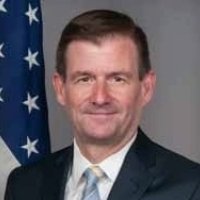What Next For the China-Pakistan Economic Corridor? A Conversation with Pakistani Planning and Development Minister Asad Umar
Asad Umar, Pakistan's federal minister for planning, development, reform, and special initiatives, provided an update on the status of the China-Pakistan Economic Corridor (CPEC), and what his government's plans are with CPEC moving forward. He also spoke about Pakistan's policy focus on geoeconomics, and on its broader development plans at a moment when the economy is facing a series of challenges.
Selected Quotes
Asad Umar, Federal Minister for Planning, Development, Reform, and Special Initiatives, Government of Pakistan
“In terms of export destinations China is not the one which has been driving Pakistan's economy recently. But, if you look at the foreign direct investment inflows there you would see a very very sharp increase in Chinese investment coming into the country and this is the impact of CPEC showing up. After the MOU (Memorandum of Understanding) was signed in June 2013 and CPEC got operationalized in a couple of years the investment numbers inflows from China significantly increase and they're much higher than any other country, and they have been growing
“The whole world is trying to balance between allowing the new technology to provide all the benefits that it does to societies, but at the same time raises significant challenges also and I think it's the same all over the world and Pakistan is in its attempt to grapple with that has come up with a new policy which has been approved by the cabinet in terms of cyber security, the social media platform that operate(s) there, what the terms of engagement would be and what are the restrictions, etc. There is a balance to be run there. We don't see this as a China-specific problem it's a technology issue and the technology causes challenges.”
"CPEC is doing two things for the investor in general. One, it is improving the quality of the infrastructure available, and second, by focusing attention it is improving the service delivery to these investors so providing them an opportunity to work in special economic zones where infrastructure needs are met where decision making is quick, where the ease of doing business that you referred to is taken care of, and that's of interest to any investor, and we are starting to see the result of that.”
Abraham Denmark, Vice President of Programs and Director of Studies; Senior Advisor to the Asia Program; Senior Fellow in the Kissinger Institute on China and the United States
“Since being launched in 2015 the China-Pakistan Economic Corridor, or CPEC, has produced a series of new infrastructure projects in Pakistan many of them focused on energy. Last month Minister Umar stated that CPEC is moving into a second phase which will focus more on accelerated industrial cooperation with China. However, CPEC has also attracted criticism including from the U.S. government. Nearly 2 years ago a senior U.S. official Ambassador Alice Wells spoke here, at the Wilson Center, and expressed concern about issues such as cost and transparency associated with CPEC. Other critics believe CPEC is constrained by Pakistan's investment climate and a lack of sufficient economic reform as well as concerns about debt and security. But CPEC endures and continues to be a major priority for both Islamabad and Beijing.”
David Hale, Distinguished Diplomatic Fellow; Former Under Secretary of State for Political Affairs; Former Ambassador to Pakistan, Lebanon, and Jordan
“When I first went to Pakistan as ambassador I checked with my chain of command at the state department about what position we should be taking on CPEC, and this of course was during the Obama administration, and I was told and I was happy to hear that we should be supportive of it. It's a decision for Pakistan and China and if it helps develop Pakistan's potential then that will be a stabilizing element and that would be favorable to United States interests.”
“I was also struck in your presentation by the fact that, as you pointed out, the United States and the European Union are actually very strong partners in Pakistan's economy in terms of the currency flows that you mentioned, being export markets for Pakistan, holder of debt, but not so much on foreign direct investment as your slide pointed out. We in the West have lagged behind China in that regard.”
Speaker
Introduction

Moderator

Former Under Secretary of State for Political Affairs; Former Ambassador to Pakistan, Lebanon, and Jordan
Hosted By

Indo-Pacific Program
The Indo-Pacific Program promotes policy debate and intellectual discussions on US interests in the Asia-Pacific as well as political, economic, security, and social issues relating to the world’s most populous and economically dynamic region. Read more


China Environment Forum
China’s global footprint isn’t just an economic one, it’s an environmental one. From BRI investments in Africa and Asia to its growing presence in Latin America, understanding China’s motivations, who stands to gain - and who stands to lose - is critical to informing smart US foreign policy. Read more


Kissinger Institute on China and the United States
The Kissinger Institute works to ensure that China policy serves American long-term interests and is founded in understanding of historical and cultural factors in bilateral relations and in accurate assessment of the aspirations of China’s government and people. Read more
